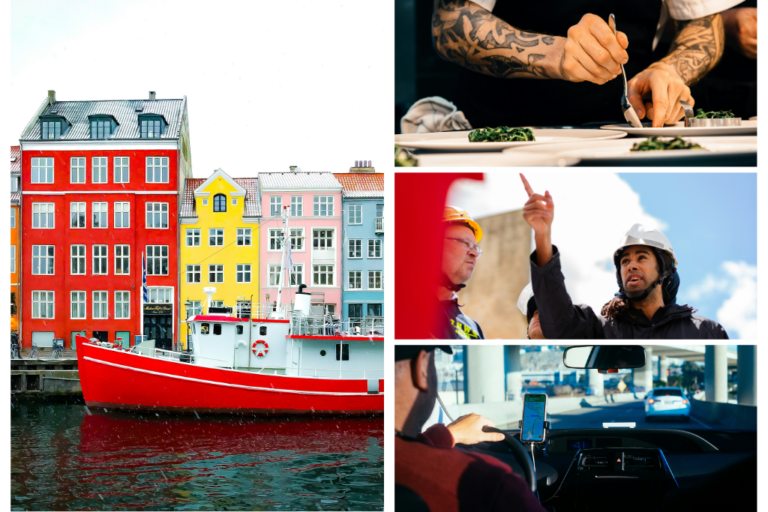Work in Denmark: Requirements and opportunities
Discover how to work in Denmark: requirements, salaries, cost of living, sectors with the highest demand, and where to find employment.
If you want to work in Denmark, it is becoming an increasingly attractive option for foreigners seeking good conditions, stability, and a high quality of life. This small Nordic country not only offers competitive salaries and a stable job market, but also places a strong emphasis on quality of life and respect for your personal time. In the following guide, you will find everything you need to know: the advantages and requirements, the most in-demand jobs, expected salaries, cost of living, and most importantly, where to find the opportunities that are truly worth it. Moving to Denmark does not have to feel like a leap into the unknown, as long as you know how to plan ahead.
Advantages of working in Denmark
A career in Denmark gives you access to a stable job market, competitive pay, and an excellent quality of life. You can enjoy strong job security, a healthy work-life balance, an inclusive workplace, and plenty of opportunities to grow professionally.
- Work-life balance: The standard workweek is usually around 37 hours, Monday to Friday, as set by collective agreements. Lunch breaks are short, and there is little of the “staying late at the office” culture.
- Generous vacation and leave policies: You get five weeks of paid vacation, accruing about 2.08 days per month, plus a holiday allowance equal to 12.5 percent of your salary. For maternity and paternity leave, the system covers up to 52 weeks, which can be shared between both parents, with certain weeks reserved individually for each.
- Competitive salaries: The average monthly salary for employees is around $6,930 gross, according to the official statistics office (Danmarks Statistik). Taxes are not low, but they fund extensive public services and benefits.
- Stable job market with “flexibility”: Hiring and firing is relatively straightforward, but there is a strong safety net and active employment policies. This helps reduce risk for professionals moving between projects.
- Widespread use of English: Denmark is rated as having “Very High Proficiency” and ranks 7th in the world in the EF EPI 2024, making it easier to work in international environments even if you don’t speak Danish at first.
- Quality of life and well-being: Ranks top 3 worldwide in the World Happiness Report due to its combination of income, social support, and low corruption.
- Safe and predictable environment: Europe is the most peaceful region, and Denmark is among the countries with high levels of safety.
- Flat work culture: Teams tend to have flat structures, built on trust and autonomy. Meeting goals is valued more than simply being present, and flexible hours are common when the role allows it.

Requirements for working in Denmark
To work in Denmark, you will need to take care of some official procedures and have the right paperwork. Here’s a straightforward overview of what is required based on your nationality and situation.
- EU/EEA and Swiss citizens: EU citizens do not need a visa or work permit to work in Denmark. If they plan to stay longer than three months, they must register with the Danish authority SIRI using a document called the EU Residence Certificate. From day one, it is common to need a tax card, open a Danish bank account, and even obtain a Nem-ID for digital transactions.
- Third-country nationals (non-EU/EEA/Swiss): Non-EU citizens need a residence and work permit before they can legally work in Denmark. Entering on a standard Schengen visa does not allow employment. The most common types of permits include: the Fast Track Scheme for quick hiring by certified employers; the Pay Limit Scheme for highly paid professionals earning above a certain annual threshold (around $60,500); and the Positive List for jobs in sectors facing a shortage of qualified workers.
- Official job offer or employment contract: With details of salary and conditions.
- Documents required for the application: You will need a valid passport, Schengen-style photos, and proof of payment for the applicable fees. If relevant, a power of attorney may be required so your employer can handle the application on your behalf. In some cases, the job must also have been advertised for at least two weeks on official platforms such as Jobnet or EURES.
Tips for starting work in Denmark
Beginning work in a new country can feel overwhelming, but with proper planning, adjusting to life in Denmark becomes much smoother. These tips will help you handle the paperwork, stay connected from the start, and get the most out of your first weeks in the country.
- Arrive with a good internet connection: Set up a Holafly eSIM with a monthly plan before your trip and keep it for at least the first month. You’ll need internet for things like registering for MitID or checking official emails. One eSIM gives you coverage in over 170 countries, avoids high roaming charges or surprise bills, and lets you stay connected from the moment you land in Denmark.
- Secure your legal basis: If you are from the EU/EEA/Switzerland, request the EU residence document from SIRI; if not, apply for a residence and work permit before you start.
- Register with your local municipality and obtain your CPR: Your CPR (Danish ID) will be assigned to you once you have registered your address. Without CPR, you won’t be able to access banking, healthcare, or employment services.
- Request your tax card (skattekort): Apply for it online so that your employer can make the correct deductions from your first paycheck.
- Activate MitID and your official mailbox: With MitID, you can access public services and read your Digital Post (e-Boks/mit.dk). It is essential for receiving notifications about taxes, healthcare, and employment.
- Open an account and set up your NemKonto: This is the account where you will receive public payments, such as tax refunds, benefits, and holiday pay. You can choose to use either a Danish or a foreign bank account.
- Adapt your CV to the local style: Keep it short (1–2 pages), focus on concrete achievements, and include links to your portfolio or LinkedIn. An English version works well, while adding a Danish version can be an advantage depending on the sector. This aligns with recommendations from Work in Denmark.
- Plan ahead: Some appointments (SIRI/CPR) take 1–2 weeks or longer; book in advance and keep digital copies of everything.
Types of jobs in Denmark for foreigners
These are the main sectors and roles where foreigners can find work in Denmark, ranging from highly skilled positions to more entry-level opportunities:
| Sector | Common positions | Common language | Key notes |
| Healthcare | Doctors, nurses, dentists, physical therapists | Danish (in most cases) | High demand in hospitals and clinics; degree recognition required |
| Life sciences | R&D, QA/Regulatory, biopharmaceuticals, clinical data | English | Highly international and expanding sector |
| Engineering | Civil, mechanical, electrical, automation, robotics | English/Danish | Key in green energy, construction, and Industry 4.0 |
| Technology and ICT | Software development, AI, cybersecurity, cloud/DevOps | English | Innovative ecosystem with job openings posted in English |
| Green energy | Design, operation, and maintenance of wind farms and power-to-x projects | English | Denmark is a world leader in wind energy |
| Industrial manufacturing | Skilled workers, maintenance technicians, supervisors | English/Danish | Highly automated processes |
| Construction and technical trades | Construction workers, welders, electricians, surveyors | English/Danish | 16% of the workforce is international |
| Transport and logistics | Drivers, planners, warehouse operators | English/Danish | Includes specialized transport (wind turbine blades, hazardous goods) |
| Services and hospitality | Waiters/waitresses, chefs, receptionists | English | High turnover; seasonal and annual opportunities |
| Finance and fintech | Banking, insurance, investment, fintech startups | English | Financial cluster in Copenhagen |
| Agriculture and farms | Livestock farming, seasonal harvesting | English/Danish | Vacancies on Jobnet; some on the Positive List |
The jobs in highest demand in Denmark for foreigners
While many sectors in Denmark welcome international talent, certain roles stand out due to high turnover or a chronic shortage of locally trained professionals. These positions offer the best opportunities if you are looking to make a move in the Danish job market:
- General practitioners and specialists in critical areas (internal medicine, psychiatry, geriatrics): With an aging population and increasing demands on the healthcare system, these positions are in high demand and offer competitive salaries, as long as you have the required Danish professional certification.
- Nurses for regional hospitals and home care: These roles are needed not only in major cities but also in smaller towns, where relocation incentives are often offered.
- Electrical and mechanical engineers for renewable energy: With the growth of offshore wind energy, there is increasing demand for professionals experienced in turbine design, installation, and maintenance.
- Industrial automation and control technicians: Denmark’s industry is highly automated and requires specialists to maintain and optimize production lines, particularly in food, pharmaceuticals, and advanced manufacturing.
- Certified electricians: For infrastructure projects and the maintenance of urban networks, with opportunities available through both public sector contracts and large private construction companies.
- Welders specializing in metal structures and wind turbine components: Companies such as Vestas and Siemens Gamesa are continuously hiring to fulfill international orders.
- IT Supporters and network technicians: Beyond senior software roles, there is strong demand for technical support positions in companies and public organizations, many of which operate in English-speaking environments.
- Cooks and chefs with experience in international cuisine: The Danish hospitality sector especially values professionals who can thrive in multicultural, high-volume environments, with opportunities available year-round.
- Truck drivers with a CE license: Logistics plays a crucial role in exports and imports, and companies are looking for professionals who can manage both domestic and international routes.
Salaries and cost of living in Denmark
In Denmark, salaries generally match the country’s high cost of living. Workers typically earn around $4,620 gross per month, though in cities like Copenhagen this can exceed $7,260. After taxes, the average net salary is about $3,080 per month, enough to cover essential expenses and still allow for some savings or leisure activities, depending on your lifestyle and location.
Keep in mind that Denmark is one of the most expensive countries in Europe. A single person typically needs a monthly budget of around $2,350, while a family of four may require about $6,440 to maintain a comfortable standard of living. Housing is the largest expense, especially in Copenhagen, so many people choose to live in smaller cities like Aarhus or Odense to balance income and costs without compromising quality of life.
Important: If you are a frequent traveler and want to stay connected without worrying about expensive roaming or looking for a new SIM at every destination, Holafly’s subscription plans are for you. With a single eSIM, enjoy internet in more than 170 countries for a fixed price and no surprises on your bill. Travel without limits and connect easily and securely! 🚀🌍

Where can I find job opportunities in Denmark?
Looking for a job in Denmark is not just about sending out resumes; it’s about knowing the right channels and understanding how the Danish job market connects companies with candidates. Here are the main ways to find real opportunities, whether you are already in the country or searching from abroad:
- Work in Denmark (WID): It is the official portal for international talent. It features job openings in English, practical guides to help you prepare your application, interview tips, and the option to send unsolicited applications to companies that interest you.
- Jobnet.dk: This is the national public employment portal and hosts the majority of job openings in the country. It is also the platform where you must register if you are unemployed. While most listings are in Danish, it is essential for gaining visibility within the system.
- EURES: The European job portal includes openings in Denmark and hosts online recruitment fairs for specific sectors such as engineering, healthcare, and technology. It is also a useful starting point for understanding working and residency conditions in the country.
- it-jobbank.dk: It is the go-to platform for tech professionals. If your background is in software development, infrastructure, cybersecurity, or AI, you will find specialized job openings here, many of them in English.
- Sundhedsjobs.dk: It gathers healthcare job openings posted by hospitals and regional health authorities. While most listings are in Danish, it is the most direct place to look for positions in medicine, nursing, or physiotherapy.
- EURAXESS: This European platform focuses on research and academic careers. It’s one of the best places to find opportunities at universities, research institutes, or for PhD and postdoctoral positions.
- Randstad Denmark, ManpowerGroup, and FLAIR: These are recruitment agencies operating in Denmark. They help match candidates with companies for temporary, permanent, or project-based roles and can be a valuable resource for landing your first opportunity.
- International House Copenhagen: It goes beyond being an information hub, offering support with initial paperwork, career guidance, and networking events for newcomers, making it an excellent way to start building professional connections.
Frequently asked questions about working in Denmark
It depends on your nationality. Citizens of the EU, EEA, or Switzerland do not need a visa, but must register their residence if staying longer than three months. Non-EU citizens, on the other hand, need a residence and work permit before they can start working.
At the moment, the most in-demand fields include healthcare, engineering, technology, renewable energy, construction, advanced manufacturing, and logistics. Many of these roles are listed on the official Positive List, which helps simplify the visa process.
Yes. Most official and private job portals allow you to apply online. In addition, Work in Denmark and EURES host virtual job fairs for candidates searching from abroad.
You can find opportunities on portals like Work in Denmark, Jobnet.dk, EURES, Jobindex.dk, it-jobbank.dk, and Sundhedsjobs.dk, as well as on company websites, through recruitment agencies, and at networking events.
The average gross monthly salary is around $4,620 and can exceed $7,260 in Copenhagen. After taxes, the typical net salary is about $3,080 per month.





 Language
Language 


















 No results found
No results found








